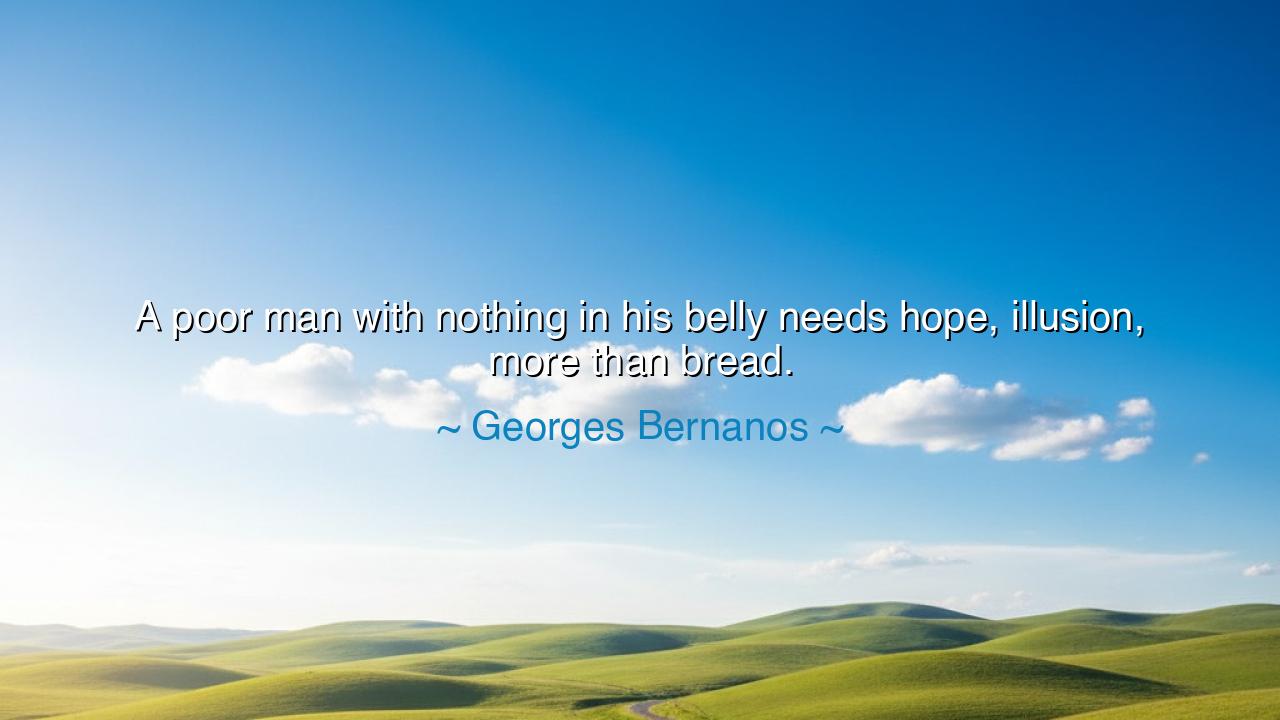
A poor man with nothing in his belly needs hope, illusion, more






“A poor man with nothing in his belly needs hope, illusion, more than bread.” Thus spoke Georges Bernanos, the French novelist and moralist whose words strike with the gravity of scripture. He was not glorifying hunger, nor dismissing the body’s need for sustenance, but rather revealing a deeper hunger—the hunger of the soul. Bread feeds the flesh for a day, but hope sustains the spirit through lifetimes. Without hope, a man is not merely poor; he is emptied of purpose, stripped of the divine spark that makes him human. For what is man without the dream that tomorrow might be better? He becomes a shadow, walking but not living.
Bernanos wrote in an age of despair, when Europe trembled between wars and faith waned beneath the weight of progress and pain. He had seen the hollow eyes of those who possessed bread but not meaning, and he knew that no full belly could fill an empty heart. His quote is not about poverty alone—it is about the condition of mankind. For the richest man who has lost hope is poorer than the beggar who still believes in dawn. To live without illusion, without even the fragile thread of dream, is to die before death has claimed you.
In this teaching lies a truth as old as civilization itself. The ancients, though surrounded by hardship, built temples, painted their caves, and sang to the stars. They created beauty even when their stomachs were empty, because beauty was proof that life was worth enduring. The slaves who built the pyramids, the exiled prophets who wrote their songs of lament, the mothers who prayed over the graves of their children—they all survived not by bread alone, but by the illusion that their suffering had meaning. It is this sacred illusion—this conviction that something greater than pain exists—that gives humanity its strength.
Consider the story of Viktor Frankl, a physician and prisoner in the concentration camps of World War II. Amid starvation and cruelty, he observed that those who lived longest were not always the strongest in body, but those who still held a hope, however small. A man who could imagine his wife’s face, or the return of spring, could endure another day of hunger. Those who lost all sense of purpose, even when food was placed before them, soon faded into death. Frankl survived, and later wrote: “Those who have a why to live can bear almost any how.” His life was a living echo of Bernanos’s wisdom—the soul’s hunger is more terrible than the body’s.
But why does Bernanos speak also of illusion? Because sometimes hope is born not from reason, but from imagination—the noble deceit that gives us strength when truth would crush us. The soldier who believes he will see home again, though the odds say otherwise; the mother who believes her child’s life will be better than her own; the artist who believes his work will outlast him—these are illusions, yes, but sacred ones. They are the soft veils that protect the heart from despair. To live without illusion is to stand naked before the cold void of existence, and few souls can endure such exposure. Illusion, in this sense, is not falsehood but mercy.
Yet there is a balance to be kept. The illusion Bernanos speaks of is not the shallow fantasy of denial, but the creative lie that keeps one moving forward until truth becomes bearable again. It is the dream that nourishes courage, not the delusion that blinds it. Even Christ, in His agony, looked beyond His suffering toward the promise of resurrection. Every faith, every revolution, every act of love begins in this same divine illusion—the belief that the impossible may yet be made real.
And so, my children, take this lesson into your lives: feed your bodies, yes, but feed your spirits more. When despair whispers that your effort is useless, remember that it is not bread alone that sustains man, but the dream of meaning. Give hope to the hungry heart as you would give bread to the empty stomach. Speak words that lift, build visions that inspire, and keep alive the sacred illusion that tomorrow can still be beautiful.
For if you ever take hope from a man, you rob him not only of comfort but of humanity itself. The poor man who dreams is still a king within his heart; the rich man without hope is already a corpse. Therefore, guard your inner flame. Even if all else is lost, let this remain: the courage to believe in the unseen, the tenderness to imagine what could be. For as long as hope lives within the human breast, no man, however poor, is truly destitute.






AAdministratorAdministrator
Welcome, honored guests. Please leave a comment, we will respond soon